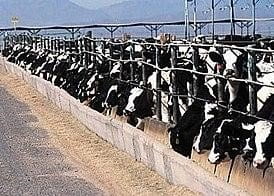By Narayan Gopinathan
The world’s food supply chains are in crisis due to the impacts of war and climate change. Many countries rely on grain imports from Ukraine and Russia, and the ongoing war there has severely impacted their ability to receive these imports. For example, India tried to make up the difference, but in an extreme heat wave caused by climate change, their grain crop wilted. As a result, India had to ban wheat exports to feed their own people [1][2].
The United States is one of the world’s largest producers of grain. However, large portions of this grain crop are diverted to produce ethanol for cars and to feed animals which are then sold for human consumption as meat. Though this meat feeds people, the quantity of food produced is much smaller than it would be if the grain was eaten directly [3].
Figure 1. An animal feeding operation. Photo credit: Wikimedia Commons.
For this important reason, and many others, efforts to electrify everything and expand public transit must accelerate to reduce the demand for oil and ethanol. In addition, Americans must do their part by eating lower on the food chain to reduce the demand for animal products. If US grain is used to feed people directly, not mediated by animals, it can go so much further, creating a surplus that can be exported to many parts of the world. A 2016 study found that a shift in the American diet from beef to plant-based proteins would create enough surplus food to feed 190 million people. Plant-based diets and end-use electrification are necessary to put the brakes on global warming. They are also necessary to bolster global food security. [4]
The United States can be the arsenal of democracy with respect to food production. They should not let anybody anywhere go hungry in the face of Putin’s aggression. Plant-based diets will allow the US to export grain and reduce world hunger.
Sources:
- “The coming food catastrophe”. The Economist. May 19th, 2022. https://www.economist.com/leaders/2022/05/19/the-coming-food-catastrophe
- Jonathan Foley. “It’s time to rethink America’s corn system.” Scientific American. March 5, 2013. https://www.scientificamerican.com/article/time-to-rethink-corn/
- Somini Sengupta. “Feeding a hotter planet.” New York Times. June 10, 2022. https://www.nytimes.com/2022/06/10/climate/food-farming-climate-change.html
- Alon Shepon. “Energy and protein feed-to-food conversion efficiencies in the US and potential food security gains from dietary changes.” Environmental Research Letters. 4 October 2016. https://iopscience.iop.org/article/10.1088/1748-9326/11/10/105002
Narayan is part of the 2020 INFEWS cohort and a PhD student in the Institute of the Environment and Sustainability at UCLA. His research focuses on electrification of transportation and other end uses of energy.

